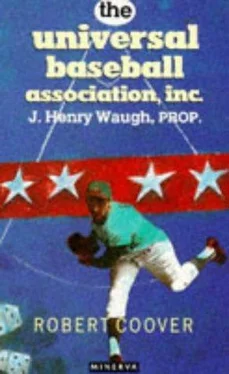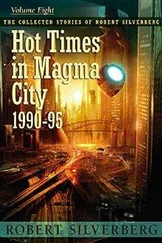"I do, but—"
"Well, then, accept a little advice, my friend. Accounting like baseball is an art and a science and a rough competitive business. Some make it and some don't. The ones who make it keep their heads up, their eyes open, their minds on their job, and pull their part without belly-aching. Wages are based on performance , Mr. Waugh, and what we want around here at DZ&Z is professionals! " He paced the room, getting worked up. "What we expect, we give. This is the American way, Mr. Waugh! Why, old Marty Dunkelmann here never quit till the moment he died! I can still remember how I came to the office that morning and found him in here, bolt upright in his chair, eyes rolled back, and one finger on an error in a column of accounts receivable. He'd showed me that mistake just the night before, the only one I've made in fifty years of accounting; we were partners but we expected just as much out of each other as we did from any employee; he must've died while I was walking out the door! I'd been sitting right where you— Waugh! Mr. Waugh! Wake up! "
Henry's head jerked up, but it was all he could do to open his eyes. "I'm sorry, Mr. Dunkelmann — Zifferblatt. I'd better—"
" I'll tell you what you'd better, Waugh, you'd better be here at 8:30 sharp on Monday morning and every morning hereafter, not one minute later, and not one single exception, and prepared to put in a full day's work , or your position with us is terminated! Have I made myself clear? "
Henry nodded and stood. Woozily. "Yes, sir."
"All right, you can go now. You're no good to anybody here today anyway — though I hardly need mention, you can't expect us to pay you for not working."
"I understand."
Ziff softened, lower lip fluttering forward in a kind of senile pout. "Now, get rested up, Mr. Waugh, and try to get over this other thing. We all suffer losses, but we must learn to live with them. Let's see if we can't make a fresh start next week. You used to be a great asset to our team here at DZ&Z, and I would like to believe you soon will be again."
"Yes, sir."
At his desk, putting away his books and materials, Henry realized his hands were shaking, his knees weak. Not anger really, just felt shot down. Ziff was right: he was getting disorganized. The old menace.
Lou in a passing whisper: "Henry! Is everything, are you…?"
"Yes. I'll be back Monday. Going home now to sleep. Thanks, Lou."
"Oh." Lou watched him close things up. "I was thinking maybe about, well, like I been saying about your eating, Henry, maybe Mitch's…?"
Lou's cure-all. "I don't know, I—"
"I was planning to go there tomorrow night… **
"Well, all right"
"Shall I come by?"
"I'll meet you there. About nine."
"Do you know where it…?"
"I'll find it."
"Monday morning!" lipped Horace Zifferblatt from his glass office, shaking his stubby index finger, then aiming it clockward, as Henry left.
Some people would look on his game, Henry realized, as a kind of running away. Lou, for instance, could not understand why he didn't see more movies or visit museums or join an interesting club or something, and though he could accept the idea of taking on outside work for extra money, he'd probably be astonished to learn about the game. But descending in the building elevator, urethra of his world prison, dropping dejectedly into a kind of private sinkhole, having to return to all that commitment and all that emptiness, Henry was aware that you could see it both ways: Roth's skylighting problems were, in a way, a diversion for him from his own. Sometimes, true, in the heat of a pennant chase, for example, his daytime job could be a nuisance, but over the long haul he needed that balance, that rhythmic shift from house to house, and he knew that total one-sided participation in the league would soon grow even more oppressive than his job at Dunkelmann, Zauber & Zifferblatt.
The elevator door yawned open, discharging him into the lobby, and thence, past the building directories and signs, into the street. A bright day, after all, though the sun's light was hard and cold. The streets, as always, were full of moving people, going going going, the endless jostling flow. They gave him somehow a vague and somber sense of fatality and closed circuits. Motion. The American scene. The rovin' gambler. Cowpoke and trainman. A travelin' man always longs for a home, cause a travelin' man is always alone. Out of the east into the north, push out to the west, then march through the south back home again: like a baserunner on the paths, alone in a hostile cosmos, the stars out there in their places, and him trying to dominate the world by stepping on it all. Probably suffered a sense of confinement there in the batter's box, felt the need to strike forth on a meaningful quest of some kind. Balls hurled down to him off the magic mound, regularly as the seasons: his limited chances. Or rather: not to him, but just to earth, passive, faintly hostile, deprecatory, masked— while he interposed himself heroically to defy the holy condition. . not knowing his defiance was merely a part of it.
So what were his possible strategies? He could quit the game. Burn it. But what would that do to him ? Odd thing about an operation like this league: once you set it in motion, you were yourself somehow launched into the same orbit; there was growth in the making of it, development, but there was also a denning of the outer edges. Moreover, the urge to annihilate — he'd felt it before — seemed somehow alien to him, and he didn't trust it. And yet: what else could he do? That 18-to-1 deformity waiting for him on his kitchen table was like a special message for him, a self-revelation, the clang of an alarm: wake up! get out! shuck it off! insane! Traffic zim-zoomed through die sunny streets. Of course, there might be more alternatives than just two.
Passing a newsstand on his way to the bus stop, he bought another newspaper. What am I buying all these damn papers for? he asked himself. Different paper, different headlines, different stories, even different horoscopes. Must be some other world. Reflecting on his Space Race League, he realized it was no solution to war, but only an enhancement of it. Like Zifferblatt said, professionals earn their pay on performance in a competitive milieu, and you couldn't expect them to abide by any gentlemen's agreement. And what code could hold in an association of total power? No, you'd have to expect bribes, double-crosses, coalitions, information exchanges, and, sooner or later, a bomb or two. The old McGraw-Cobb syndrome: cut 'em up! If you're the only one left standing, you just gotta be the winner — the way Rag Rooney and Frosty Young played ball, and it got them into the Hall of Fame, didn't it?
Waiting for the bus, he saw that storefront across the street — Thornton's. Well, that's right, Barney surely had the right to bring up a replacement for Damon. Injuries were one thing, but a dead ballplayer was another. Unprecedented, but the Association was bound to approve it So why not Thornton Shadwell? The thought cheered him some, and then on the bus, he had other ideas. First of all, that the circuit wasn't closed, his or any other: there were patterns, but they were shifting and ambiguous and you had a lot of room inside them. Secondly, that the game on his table was not a message, but an event: the only signs he had were his own reactions; if these worsened, it might be best, after all, to close down the Association, maybe invent some new game, or in fact go join some club or other. But first he should finish out this season. He had this weekend to get it done. Then he'd be free to do as he wished. Maybe some kid pitcher would pick up where Damon left off. It was possible. And besides, it was irrational, but in spite of that game on the table, he felt certain the Pioneers were going to take the pennant. Why not? First, though, he thought, alighting from the bus, let's hit the sack, team.
Читать дальше












